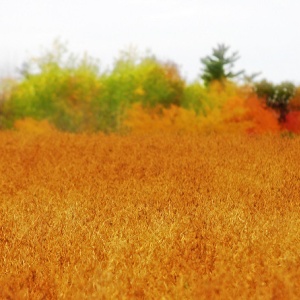
This paper by researchers in the US and Australia reports the findings of a long-term field-trial-based investigation into the effect of elevated carbon dioxide concentrations (CO2) on soy yield and drought tolerance. Their findings challenge the widely-held belief that crop yield will be increased by elevated CO2 (the so-called CO2 fertilisation effect) both because of increased photosynthetic rate, and because of lower susceptibility to drought: it has long been assumed that in higher CO2 conditions, stomatal conductance will be lower, leading to slower water loss from the leaves, slower water uptake from the roots, and consequently more moisture remaining in the soil for longer, thereby sustaining crops in limited rainfall.
This paper by researchers in the US and Australia reports the findings of a long-term field-trial-based investigation into the effect of elevated carbon dioxide concentrations (CO2) on soy yield and drought tolerance. Their findings challenge the widely-held belief that crop yield will be increased by elevated CO2 (the so-called CO2 fertilisation effect) both because of increased photosynthetic rate, and because of lower susceptibility to drought: it has long been assumed that in higher CO2 conditions, stomatal conductance will be lower, leading to slower water loss from the leaves, slower water uptake from the roots, and consequently more moisture remaining in the soil for longer, thereby sustaining crops in limited rainfall.
To investigate these claims, the researchers carried out two field trials over eight years using the SoyFACE facility in the Midwestern US, where more than 25% of global soy (Glycine max) is grown. The first eight-year-long trial involved growing soy at either ambient or elevated CO2 and measuring the impact on soil moisture content and yield. For three of those years, the researchers overlaid onto half of the existing CO2 experiment an additional drought experiment, in which half the plots were given reduced rainfall while the other half received a sufficient and consistent supply of water. The researchers then used multiple physiological measures of productivity to assess the impact on the crops.
Key findings:
- The impact of elevated CO2 on soil moisture content in the 8-year study varied widely from year to year, and was strongly influenced by non-controlled environmental factors, such as length of natural droughts. Where higher CO2 did coincide with increased soil water content, no link to lower stomatal conductance was demonstrated, ruling this out as a likely mechanism and contradicting the previously held beliefs outlined in the first paragraph of this summary. In the three-year study, soil water was not increased by elevated CO2 under reduced precipitation.
- Within biologically plausible ranges, more intense droughts were shown to be robustly associated with a smaller CO2 fertilisation effect, across seven highly diverse soy cultivars.
- Contrary to the previous assumption that plants grown in elevated CO2 would use and lose less water, leaving more in the soil from which they could benefit in times of drought, elevated CO2 was shown to lead to altered root structures that were less conducive to accessing soil water. Moreover, it was suggested that drought and elevated CO2 in combination may impair nitrogen fixation. Thus crop growth in drought conditions was not improved by elevated CO2.
- Due to changes in biochemical signals within photosynthetic cells, in drought conditions elevated CO2 did not actually lead to increased CO2 concentrations within leaf cells, and there was consequently no extra CO2 available for photosynthesis and by extension growth. In other words, drought eliminates the benefits to crops of elevated CO2.
While the findings of this detailed, long-term and contextually-relevant study are important to our understanding of how increased greenhouse gas concentrations in the atmosphere will impact on staple crop plants, these experiments will need to be replicated at larger scales and with other crops too if we are to understand the extent of the observed effects and the implications for future global food production and, ultimately, food security.
Abstract
Stimulation of C3 crop yield by rising concentrations of atmospheric carbon dioxide ([CO2]) is widely expected to counteract crop losses that are due to greater drought this century. But these expectations come from sparse field trials that have been biased towards mesic growth conditions. This eight-year study used precipitation manipulation and year- to-year variation in weather conditions at a unique open-air field facility to show that the stimulation of soybean yield by elevated [CO2] diminished to zero as drought intensified. Contrary to the prevalent expectation in the literature, rising [CO2] did not counteract the effect of strong drought on photosynthesis and yield because elevated [CO2] interacted with drought to modify stomatal function and canopy energy balance. This new insight from field experimentation under hot and dry conditions, which will become increasingly prevalent in the coming decades, highlights the likelihood of negative impacts from interacting global change factors on a key global commodity crop in its primary region of production.
Reference
Gray, S.B., Dermody, O., Klein, S.P., Locke, A.M., McGrath, J.M., Paul, R.E., Rosenthal, D.M., Ruiz-Vera, U.M., Siebers, M.H., Strellner, R., Ainsworth, E.A., Bernacchi, C.J., Long, S.P., Ort, D.R., and Leakey, A.D.B. (2016) Intensifying Drought Eliminates the Expected Benefits of Elevated Carbon Dioxide for Soybean. Nature Plants 2 (9), 16132
Read the full paper here (paywall) and for further coverage see here.







Post a new comment »